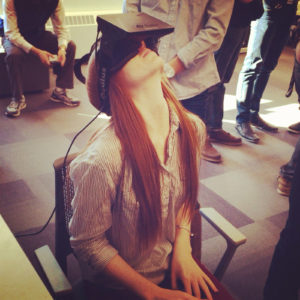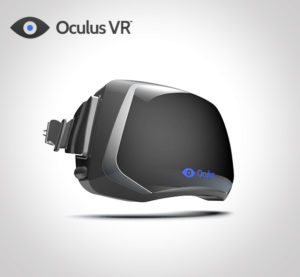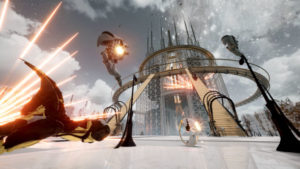Multiple Perspectives

My name is William G. Chandler Jr. I write articles, for Slickster Magazine from the Nintendo Switch perspective. In this case, I found a novel opportunity. Derek Reeve, of PR Hound fame, was able to hook me up.
Derek offered me the code for a game, Singularity 5, by Monochrome Paris and for Oculus Rift, for review. This was out of my realm of experience. However, it was also hardware readily available, with some help.
Lansdale Library, in Pennsylvania, is an active, vital, community hub, it is a place to acquire knowledge. Lansdale Library accepts a variety of cultures and lifestyles.
The library also provides great fun, values, and entertainment, if you allow it. In my case, this library allows both the use, with guidance, and understanding of the hardware Oculus Rift.
This is great exposure for those who know this hardware and do not know it. In order to do this review, I offer my perspective. However, I also need the perspective of one librarian, who knows the hardware.
What is Oculus Rift?

Home consoles use controllers, the main console, and software to provide its players a fantastic experience on their television. Oculus Rift uses a unique pair of three-dimensional goggles, with headphones, two hand controllers, two area cameras, highly efficient software, and a powerful personal computer to provide in-depth experiences.
A home console thrives on your television, in two dimensions. Oculus Rift requires a room, space, and your upper body, to give you games that push your two-dimensional experience out and into a three- dimensional window.
For example, Nintendo Switch offers Nintendo Entertainment System’s Duck Hunt for players with that nostalgic itch. Oculus Rift offers a different Duck Hunt. In this case, the game surrounds you.
You are in the field. Imagine your gun in your hand. Shoot and watch ducks fall in front of your eyes. This happens in a room around you, through Oculus’ hardware.
The Hardware

I do not know Oculus Rift. A librarian, at Lansdale Library, was able to break down the specifics of the personal computer setup. First, here is a little about them. The person I worked with is a 47-year- old librarian, with a Masters in Library Science, and an undergraduate degree in computer information systems.
They run a STEM (Science, Technology, Engineering, and Mathematics) class at the library. That is how they gained experience in virtual reality. They play board and card games, at least once a week.
The last game system purchased was a PlayStation 2. He currently owns a Nintendo Wii.
He knows the Oculus Rift is three-years-old and is owned by Facebook. The computer used for this Oculus Rift setup is a Hewlett Packer Omen with an Intel Core i5 7400. It has 3.00 Gigahertz and runs through a 64bit Windows 10 Home operating system.
This Hewlett Packer Omen uses 8 Gigabytes of RAM and accesses an Nvidia GeForce GTX 1060 3GB video card for its games. In the end, the system is, in his words, “immersive”, and “takes you into the game”.
Oculus Rift, before you play, requires you to measure your game space, with two area cameras. The computer system, hand controllers, and headset all must initialize before your experience begins.
Into The Rift

This librarian and I would take turns with the game, Singularity 5. This game is a wave shooter. This game literally throws tons of enemies at you in a variety of environments.
Players use their head, and neck, to look over the game environment through three-dimensional goggles. Sound enters your ears through a high definition headset.
We used hand controllers to grab weapons out of thin air. The librarian and I also used the controllers to push, attack, and move items in the vast environment with a combination of buttons, hand motions, and triggers, as games require.
In Singularity 5, players elevate into the game environment. The librarian described the game world as “detailed and expansive.” Enemies attack and defend from all sides. The environments remind me of the indoor areas of a game called, Bioshock from 2K Boston, or Irrational Games. You pull guns out of thin air.
You turn, look up and down, and shoot the mechanized enemies in the game. Enemies also thrust metal obstacles, at you, to stop your game progress. Enemies throw grenades.
Players bat the grenades away from themselves, or back at enemies. This librarian described the action in the game as “fast and heavy”, but with cut scenes to give him, enough of a break between attacks.
Three Dimensional Difficulties

The majority of the game experience was good. There were a few issues. There was repetitive music in the game, at times. Singularity 5, when in Hewlett Packer Omen’s Ultra Graphics mode, slowed down or glitches, in this setup.
The game also requires constant, fast twitch, head, neck, and hand movement. This might be too much for some players.
Conclusion
Singularity 5 was a short experience but is a spectacular one. The most important thing, in all of this, is its accessibility in a diverse, community, library. The game is a demonstration of what is possible in a detailed, three-dimensional environment. It is a taste of truly great game experiences to come.
Top Links
- Brooke Smith http://www.slickstermagazine.com/brooke-smith-girl-of-the-week/
- UFC Fight Night 146: Lewis Vs. Dos Santos – Matchups http://www.slickstermagazine.com/ufc-fight-night146-lewis-vs-dos-santos-matchups/
- Omega Strike Nintendo Switch Review http://www.slickstermagazine.com/omega-strike-nintendo-switch-review/
